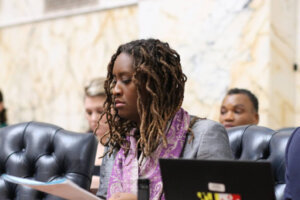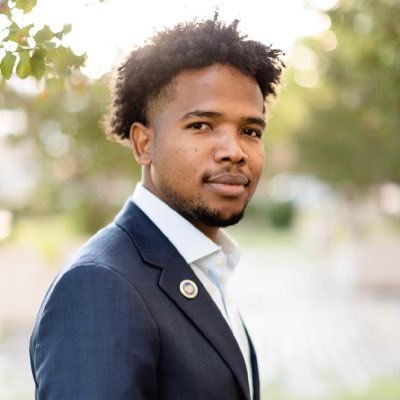This article was republished with permission from WTOP’s news partners at Maryland Matters. Sign up for Maryland Matters’ free email subscription today.
This content was republished with permission from WTOP’s news partners at Maryland Matters. Sign up for Maryland Matters’ free email subscription today.
At least two state senators are actively working to defeat House incumbents in their districts in party primaries, where early voting begins Thursday.
In Baltimore City’s District 45, state Sen. Cory McCray (D) has assembled a ticket with two House candidates that pointedly does not include Del. Stephanie Smith (D). And in Montgomery County’s District 39, state Sen. Nancy King (D) and two of the district’s House members are hoping to defeat the other incumbent delegate, Gabriel Acevero (D).

“We just haven’t worked well with him,” one of District 39’s other delegates, Kirill Reznik (D), said by way of explanation. “We have not really gelled as a team.”
Maryland’s unusual political construct — with senators sharing legislative districts with three delegates — often leads to political awkwardness, shifting alliances, and bad feelings. District pairings can be like shotgun marriages, and lawmakers may diverge based on party affiliation, ideology, mentors, political pedigree, personal ambition, and so much more.
Lawmakers in some districts become fast friends. Others develop a grudging, workman-like relationship. Others grin for the cameras in group photos but grit their teeth the rest of the time. And still others are in open warfare. Open seat races, or districts where lawmakers aren’t all from the same political party, create their own dynamics.
A quick survey of the legislative landscape this political season reveals a variety of potentially tense scenarios, some conceivably more explosive than others — and some of which have now been resolved to one degree or another:
- In Baltimore County’s District 11, Sen. Shelly Hettleman (D) is remaining neutral as three House incumbents — Dels. Lisa Belcastro, Jon Cardin and Dana Stein — compete for two seats in a newly-drawn subdistrict, 11B.
- In Montgomery County’s District 17, Sen. Cheryl Kagan (D) signaled last year that she would not support Del. Jim Gilchrist (D), who is close to another District 17 lawmaker, Del. Kumar Barve (D), and instead favored a challenger, Joe Vogel. Gilchrist ultimately decided not to seek reelection, and now Barve, Del. Julie Palakovich Carr, Vogel, and a fourth Democrat, Joe De Maria, are competing for three House seats in the primary.
- In Anne Arundel County’s District 33, Del. Sid Saab (R) appears to have pushed out state Sen. Ed Reilly (R), who announced his retirement after Saab decided to run for Senate. Reilly said he was planning to step aside all along, but not everyone is so sure.
- In District 37 on the Middle Shore, there can’t be a harmonious Republican ticket because Del. Johnny Mautz has decided to challenge Sen. Adelaide Eckardt in the GOP primary.
- In District 43 in Baltimore City, Sen. Mary Washington (D) has endorsed Logan Endow, who almost won a city council seat two years ago, in a Democratic primary for two House seats in District 43A. The primary also includes Del. Regina Boyce and Elizabeth Embry, who has run for lieutenant governor and mayor in the past. Washington has indicated that she is comfortable with both Boyce and Embry, both of whom have racked up an array of endorsements from other political leaders.
On the other hand, in a historically fractious district, Montgomery County’s District 19, state Sen. Ben Kramer (D) and the three delegates, Charlotte Crutchfield, Bonnie Cullison and Vaughn Stewart, are running together as a team with only minimal opposition. Which proves that anything can happen from one political cycle to the next: There have been competing factions among District 19 Democrats for decades.
District 45: Battle of the titans
In District 45, the schism between McCray and Smith, who are considered two of the smartest and savviest young members of the General Assembly (he is 39 and she is 41), troubles Annapolis denizens and longtime observers of the East Baltimore district. He is the chair of the Baltimore City Senate delegation and she is the chair of the city’s House delegation, which may explain some of the tension. But District 45 has been defined by competing factions for several decades as well.
McCray is running on a ticket with two Democratic House candidates, Jackie Addison, a community activist and member of the Baltimore City Democratic Central Committee who works for the mayor’s office, and Caylin Young, an attorney who is the deputy director of the Baltimore City Office of Equity and Civil Rights. Although he has not formally endorsed her, McCray has donated $1,000 to Del. Chanel Branch (D), who is seeking a full term after being appointed to a House seat in 2020. Branch’s father, longtime House Majority Whip Talmadge Branch (D), holds the third House seat in the district, but he decided on the day of the filing deadline that he would not seek an eighth term.
Smith, who was elected in 2018, said she was surprised that McCray would resort to “the nuclear option” and oppose her reelection — especially without a heads-up or an explanation.
McCray, who knocked off longtime Senate incumbent Nathaniel McFadden in the 2018 Democratic primary after serving one term in the House, said he felt some of Smith’s actions as House delegation chair were detrimental to the district and the city, especially when she blocked certain pieces of legislation.
McCray said he was particularly upset that she held a bill of his in 2020 that would reduce the hours certain bars and liquor stores could operate in their district — a measure that eventually became law when it was attached to a different piece of legislation. And he was unhappy when the city’s House delegation sat on one of his bills from this year that would have authorized the city of Baltimore to create a U.S. Department of Agriculture-sanctioned soil conservation district, something that every other jurisdiction in the state has, enabling them to collect certain federal funds. The bill eventually made it out of the delegation in the final days of this year’s legislative session, but without enough time to make it through the full House.
“Some of the bills I put forward in terms of empowering our district, she was in opposition,” McCray said.
Just last week, the Maryland Court of Special Appeals rejected a challenge to the law governing bar and liquor store hours. The tavern owners had argued that the measure violates the constitutional guarantee of equal treatment under the law, but the judges found that the legislation was not the product of racial discrimination but rather a desire by sponsors to curb violence in the community.
McCray called Smith “smart as hell” but said her legislative tactics while the measure was under consideration created unnecessary headaches.
McCray said he has not put out any literature against Smith, but is making it known in the community that he opposes her. Smith said that as she door-knocks in her district, she has encountered some questions about the lawmakers’ fissure, but feels confident in her prospects after she and campaign volunteers have hit about 12,000 households in the past five weeks.
“I’m just running my campaign,” she said, noting that she is touting her work raising awareness of the Census among her constituents and bringing information and resources to the district during the worst of the COVID-19 pandemic.
Through June 7, Smith reported $88,472 in her campaign account. Addison had $25,402 — supplemented by a $6,000 contribution from the slate committee of gubernatorial candidate Tom Perez and his running mate, former East Baltimore City Councilmember Shannon Sneed (McCray is a prominent supporter of the Perez-Sneed ticket).
Branch reported $66,288 in her war chest in early June, aided by a $25,000 contribution from the Eastside 45 Slate, a campaign committee controlled by her father. Young had $26,000 on hand, including a $6,000 donation from the Perez-Sneed slate, and also reported a $30,000 debt to himself. A fifth Democratic House candidate, teacher George Johnson, had just $242 in the bank.
Asked whether she and McCray will be able to work together if she’s re-elected (McCray is running unopposed in the primary and the general election), Smith replied, “I can always work with anyone.”
District 39: Alone again, naturally
In District 39, which takes in Montgomery Village, most of Germantown and parts of unincorporated Gaithersburg, King, Reznik and first-term Del. Lesley Lopez (D) are running on a ticket with Clint Sobratti, a Ride-on Bus driver and union activist who finished last in the seven-way Democratic House primary four years ago.
That leaves Acevero, who is finishing his first term, as the odd man out.

And that may not be so surprising: Four years ago, King and Reznik teamed with then-Del. Shane Robinson and Lopez, a political newcomer. Although they were bunched close together, Lopez finished first, Acevero second, Reznik third and Robinson fourth. Acevero, who was just 28 when he was elected, had been a field representative and organizer for MCGEO, the union for many Montgomery County government workers — the same union that Sobratti is active with now.
Since his election, Acevero has been a part of a small cadre of young democratic socialists in Annapolis who occasionally find themselves at odds with legislative leaders. He has butted heads with fellow Democrats on certain police reform measures and was the only Democrat to vote against congressional and legislative district maps put forth by legislative leaders. Acevero is unapologetic.
“I’m an independent and progressive voice for my district, one of the most diverse districts in the state,” he said.
But that independence has clearly irked the other District 39 incumbents. They’ve decided to embrace Sobratti, Reznik said, because “we feel he’s more of a team player with us and has the same progressive values that we all have, including Gabe, but is much more interested in the collegial aspects of serving in the legislature.”
“We are as progressive as Gabe is,” Reznik added, “but I think we’re more effective, to be honest with you.”
Acevero said he is content to run on his record, which includes advocating for Anton’s Law, a key part of the police reform package that passed in 2021, along with health care, guaranteed income and school funding measures. He also cites his constituent work during the pandemic.
Acevero and his allies are incensed over some mailers that have been paid for by the Team 39 Slate, which tout the incumbents’ legislative work over the past four years and feature photos of King, Reznik and Lopez with Sobratti. This, in Acevero’s view, implies that Sobratti has already been a member of the legislature.
“What they’re trying to do is play District 39 voters for fools,” Acevero said. “They’re trying to erase the work I’ve done for the district.”
The incumbents have been endorsed by a similar array of progressive groups, labor unions and environmentalists. Sobratti, whose campaign website features quotes from Malcolm X and Marcus Garvey, has some union backing as well.
None of the House candidates had overflowing campaign war chests as of June 7: Reznik led the way with $38,060 on hand, followed by Lopez with $25,652, Acevero with $10,732, and Sobratti with $7,735. The Team 39 slate, controlled by King, had $21,578 in the bank.
Despite his colleagues being arrayed against him, Acevero expressed confidence.
“You don’t coronate candidates,” he said. “You elect them.”







